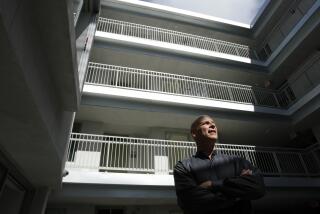Covington Development Halts Operations : Finances: Troubled Santa Ana home builder defaults on $13 million in loans, bond debt. Officers have moved to Nevada.
Covington Development Group Inc., which built thousands of homes throughout California in its 31-year history, has quietly closed shop after apparently failing to come to grips with severe financial problems.
The Orange County-based company, hard hit by the four-year depression that has decimated Southern California’s housing industry, has defaulted on more than $13 million in bank loans and corporate bond debt.
After closing the doors in late August, the company’s four top executives started a new development concern in Lake Tahoe, Nev.
Covington most recently was headquartered in Santa Ana, where it moved after losing its Fullerton office building in a foreclosure early last year.
Investors in some of Covington’s limited partnerships expressed concern Wednesday that their money has disappeared along with the company.
“Basically, they’re stonewalling everyone,” Robert Schachter, a Torrance attorney representing 20 clients who invested about $700,000 in two partnerships, said of the Covington executives. Investors in one of the partnerships won a $347,000 judgment against Covington this year, but have yet to see the money, Schachter said.
Philip W. Green, a Newport Beach attorney who represents Covington, declined to comment.
Loran D. Covington, the company’s chairman, president and chief executive, apparently has relocated to Nevada with three other Covington executives: Chadley R. Covington, a vice president; George E. Reinhardt, chief financial officer; and James Evans, in-house counsel. They could not be reached for comment.
Covington officials had blamed the company’s financial woes on the regional home-buying slump that began in early 1990. The developer was last profitable in 1989, when it earned $4.2 million. Since then, it has lost more than $15 million.
In June, 1992, Covington’s 14 million shares of common stock were dropped from the Nasdaq market because the company no longer had the minimum $1 million in capital and cash surplus required for the listing.
Despite its financial problems, Covington has not filed for bankruptcy. “What for?” asked Dan Montano, an outside financial adviser for the company until last June. “How are you going to get money from someone if they don’t have any?”
Instead, he said, the company’s executives hoped to pay off some of their debts by starting fresh in a more favorable marketplace. “We had meetings with creditors in April, and the vast majority were prepared to work with” Covington officials, Montano said. “Part of the restructuring plan was to relocate to an area that could absorb their product--$150,000 houses.”
But a former employee who invested in one of several real estate partnerships formed by the company complained that Covington executives have made themselves scarce over the past few months.
“Covington became a public company way back in 1972,” said George Liolios, a corporate vice president and 20-year veteran of the company who was terminated last year. “Can they do this? Can they just fade away?”
The company’s stock was held by almost 4,000 shareholders when it was dropped from Nasdaq trading.
More to Read
Inside the business of entertainment
The Wide Shot brings you news, analysis and insights on everything from streaming wars to production — and what it all means for the future.
You may occasionally receive promotional content from the Los Angeles Times.










